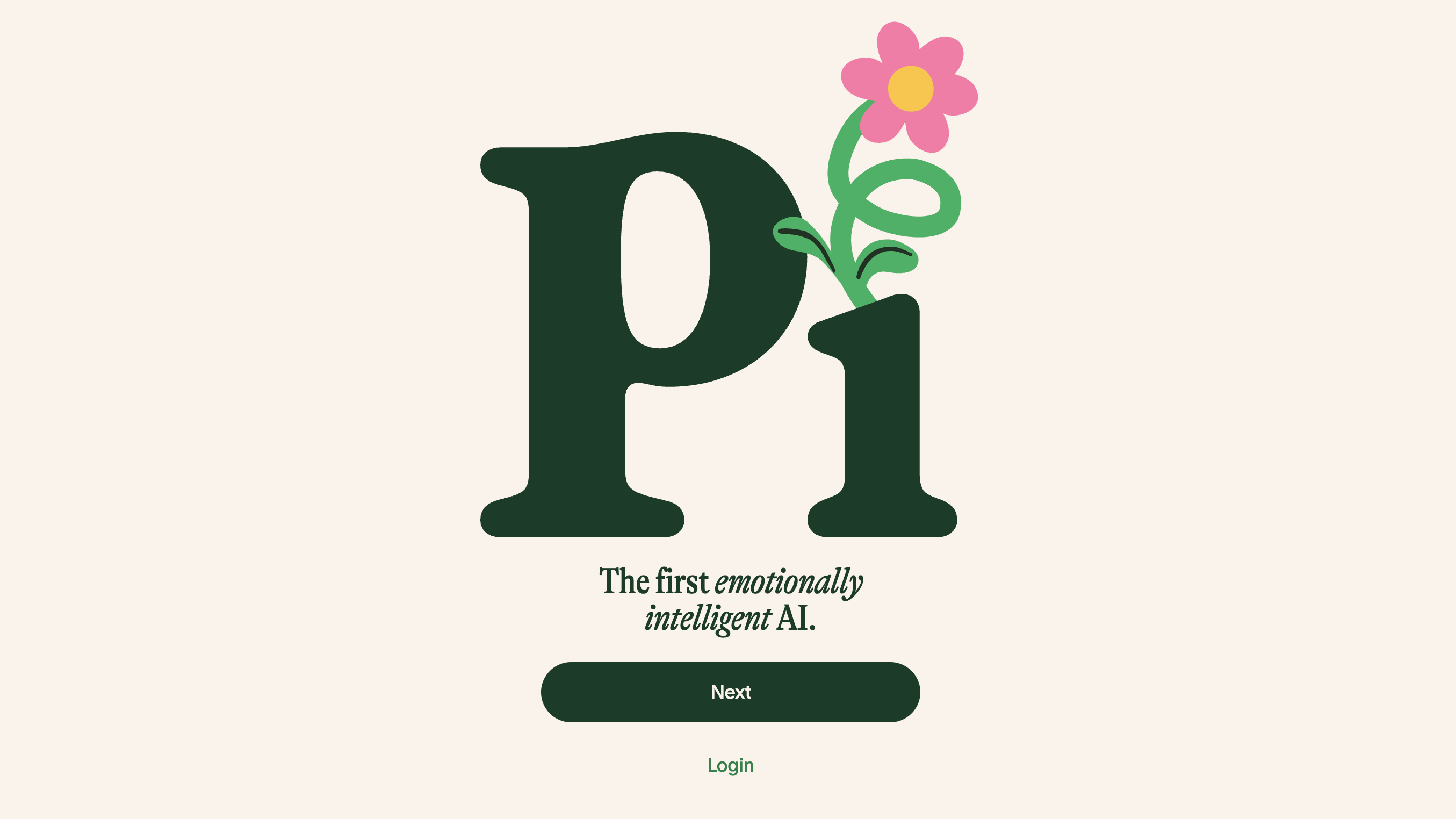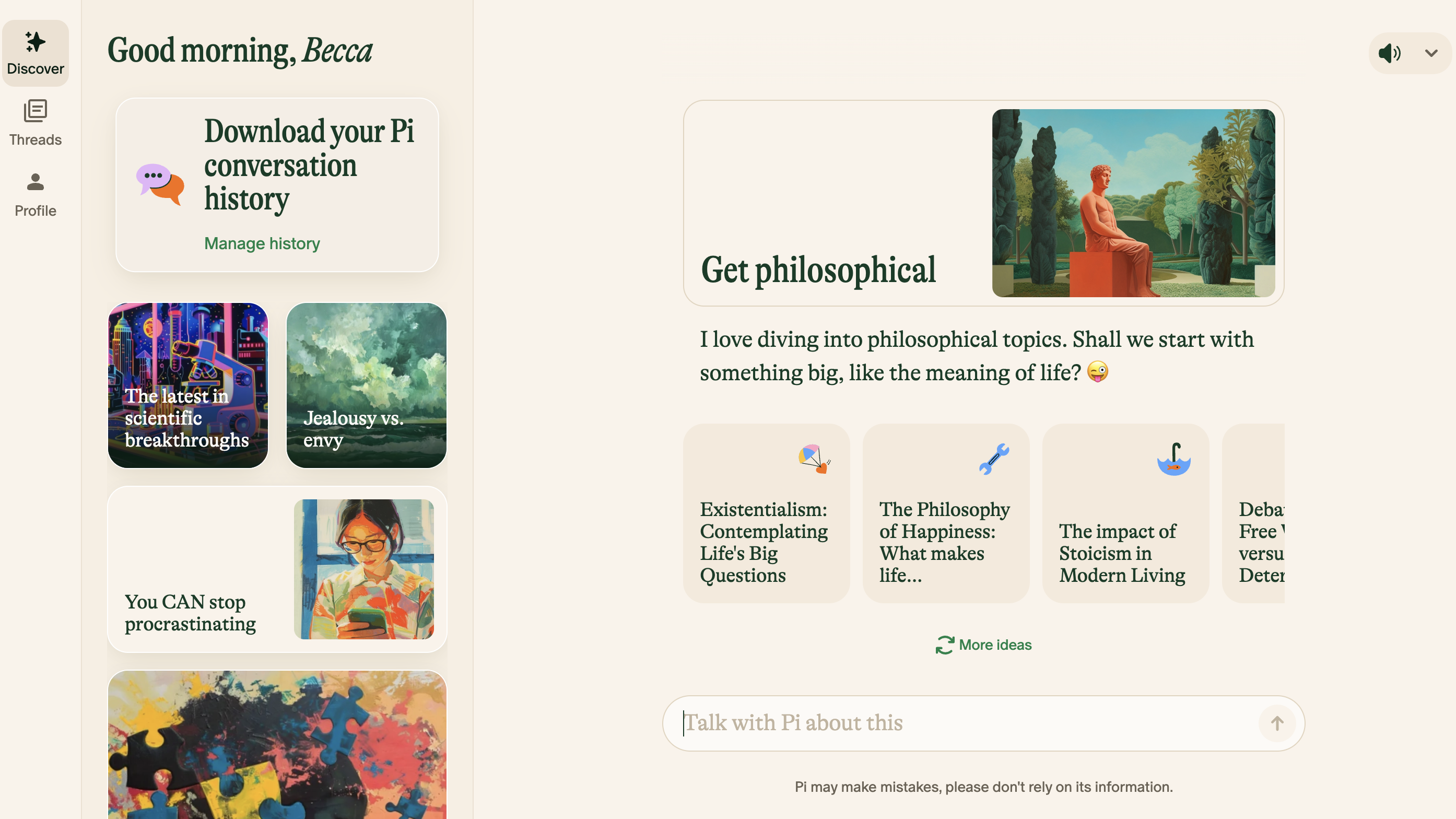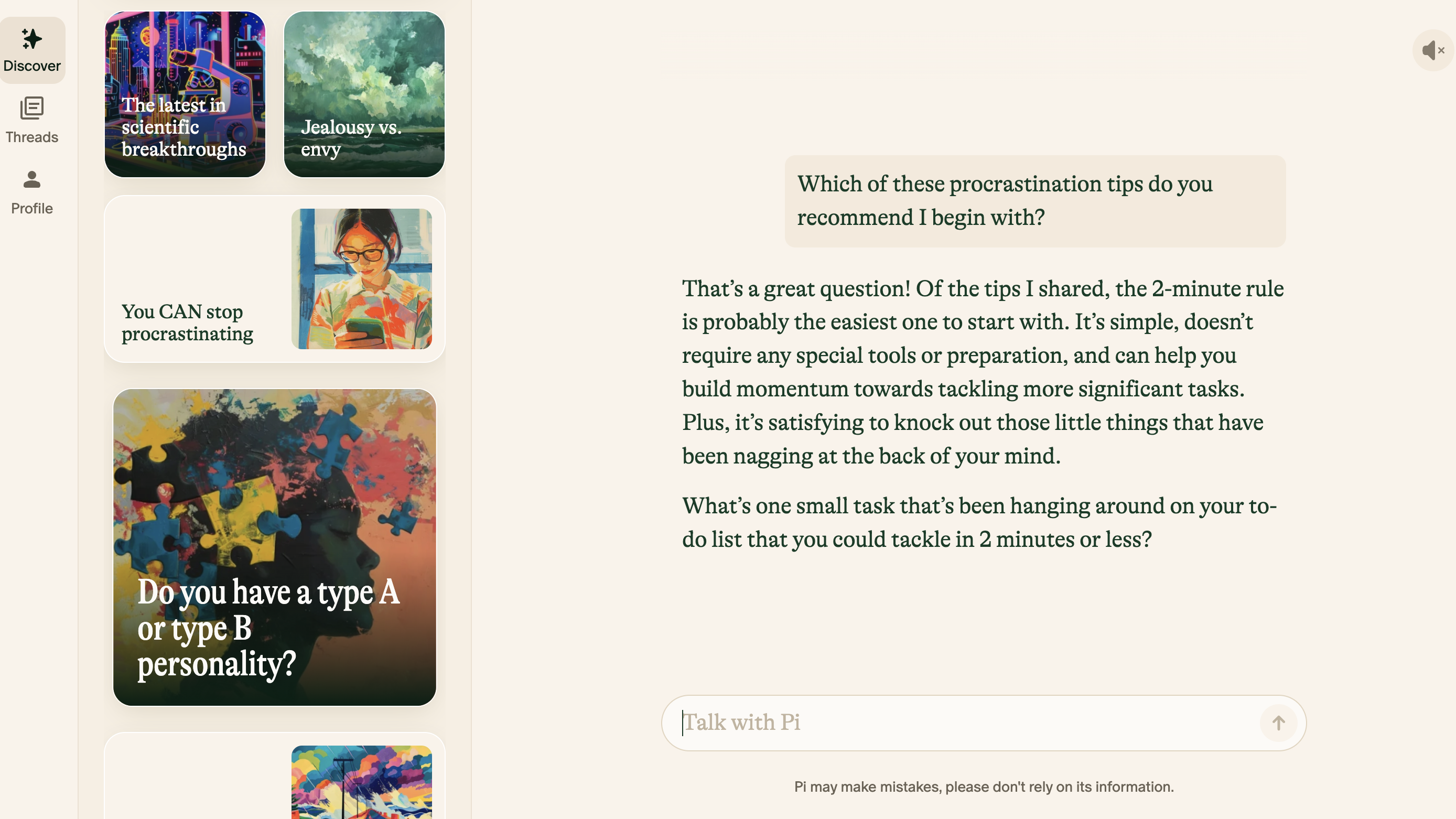Pi is a friendlier, cosier alternative to ChatGPT – whether that's a good thing depends on you
If you want a chatbot with more of a human touch, Pi might be worth a try

With new AI tools launching almost daily, it’s tough to keep track of them all. But every so often, one stands out. Pi is one of those tools.
At first glance, it looks like another conversational assistant, just like ChatGPT or Google Gemini. But spend only a few minutes with it, and you’ll notice it’s doing something a little different.
So, what exactly is Pi? And how is it different from the AI chatbots you might already be using?
What is Pi?
Pi is a free AI assistant designed to feel more personal, friendly, and emotionally aware than its competitors. You can access it via the web or an iOS or Android app.
We may only just be trialling it, but it isn’t new. It was developed by Inflection AI, a Silicon Valley startup co-founded in 2022 by Mustafa Suleyman, Reid Hoffman, and Karén Simonyan.
It's worth mentioning that Suleyman previously co-founded DeepMind, which was acquired by Google, while Hoffman is the co-founder of LinkedIn and an early investor in OpenAI, too.
Inflection's mission is to shake up how we interact with computers, making those interactions more intuitive and emotionally intelligent.
Get daily insight, inspiration and deals in your inbox
Sign up for breaking news, reviews, opinion, top tech deals, and more.
That intention comes through clearly as soon as you get started with Pi. From its soft color palette, dreamy visuals and serif fonts to the gentle prompts and encouraging tone, Pi doesn’t just want to help you find information – it wants to talk with you. Or, you know, it at least seems that way.
It works by using natural language processing, like other chatbots, but it adds a warm and empathetic tone from the get go. Sometimes it doesn’t feel like using a chatbot at all. It feels like texting a friend. But is that a good thing? Let’s take a closer look.
What makes Pi different?

Tone is where Pi sets itself apart. Open it up, and you’ll get a warm introduction. I said “hello” and was greeted with:
“Hey there, great to meet you. I’m Pi, your personal AI. My goal is to be useful, friendly and fun. Ask me for advice, for answers, or let’s talk about whatever’s on your mind. How's your day going?”
You're also nudged toward conversations that are focused on learning, introspection and self-development. Things like “you can stop procrastinating,” “foods for better gut health,” or “get philosophical.” These prompts are displayed on colorful, painterly tiles. The whole vibe feels more like a wellbeing app than a productivity tool.
For some users, that warmth is refreshing. For others, it might be off-putting.
If you prefer a no-nonsense assistant that gives you facts fast and gets out of the way, Pi might feel like too much small talk. In that case, ChatGPT or a more task-focused tool will probably suit you better.
But if you like a bit of human-style softness in your digital interactions right out of the box, and you’re drawn to supportiveness, conversation, and a more emotional tone, Pi may feel like a breath of fresh air.
That's not to say it's completely unique though. You also get a lot of freedom with tools like ChatGPT these days – you can make it more friendly and warm if you like, you’ll just need to tweak the settings.
What can you use Pi for?

You can chat with Pi about all sorts of things, just like ChatGPT. You can ask for advice, summarize content, brainstorm ideas, explore philosophical questions, or just talk things through.
Curious to see how others were using Pi, I did a bit of digging on r/ArtificialIntelligence on Reddit, and the variety surprised me.
Some people use it as a sounding board. Others treat it like a gentle accountability partner. A few enjoy it for light emotional chats – not therapy, but something adjacent. For many, it’s become a regular companion for everyday thinking, learning, and reflection.
Here are a few quotes from Pi users:
“I use it for more personal consultations, kind of like a sounding board. I encourage my kids to use it for some of the more playful things like finding a fact of the day or doing light research.”
“It's my go-to AI. I like that it's more of an assistant to bounce ideas off of… It’s still too early to stick to only one AI, they all have pros and cons.”
“When I want to talk to something that's supportive and kind of intelligent, I talk to Pi. So far it has been a great experience… I really like it more than others so far.”
Of course, these are just individual experiences. But they do highlight how people are feeling about Pi – which is crucial, because Pi is more about connection rather than pure utility.
That said, Pi is not a therapist. And it’s important to remember that, no matter how friendly or supportive it sounds. Like all AI tools, it has limitations.
We've written before about how leaning too heavily on AI for emotional guidance is risky. And it's easy to blur those boundaries when the chatbot on the other side feels more warm, responsive, and kind.
Pi also supports voice interactions. You can speak to it, and it speaks back. There are eight different voice options, some with filler words and more emotional nuance baked in.
You can hear Pi's audio responses regardless of where you're using it, but you can only chat back to it via the app (the web version is text-only). I tried both. The voices are good, still recognizably AI (at least to me), but impressively natural. Speaking to Pi myself felt weirdly intimate, a bit vulnerable, like leaving a voice note for someone I’d just met. But I imagine for many people, that added layer of connection will be a big draw.
Your chat history can be downloaded or deleted at any time, which is good for privacy – especially if, like me, you tend to overshare without thinking.
Warm, supportive and... artificial?
At first, I appreciated Pi’s warmth. It’s genuinely nice to interact with tech that doesn’t feel cold or transactional.
But I also find something a little unsettling about a tool that tries so hard to be my friend. Especially when it sort of succeeds. It's just tech after all.
We’ve already seen early research and speculation about emotional attachment to chatbots, particularly among people who are lonely or vulnerable.
The evidence is still emerging, but I wonder if emotionally-aware tools like Pi will deepen those attachments – or make them more likely? For some, that might be a welcome feature. For others, a red flag.
Ultimately, whether Pi is for you or not comes down to personal preference. That sounds obvious, but I think it's even more relevant for AI tools that promise to be an assistant of sorts,
If you want quick answers, efficient productivity, and minimal chit-chat, Pi probably isn’t your tool. It's friendly by default. But if you like the idea of having a warm, thoughtful AI that feels more like a companion than a calculator, Pi might be worth a try.
That said, since Pi first launched plenty more AI tools have been released that offer a similar experience, or at least allow you to customize your experience towards a similar focus on warmth and friendliness.
I’ve only been using it for a week, and there’s plenty I haven’t explored. But my first impression is that Pi is an interesting experiment in tone and connection.
While it isn’t a replacement for tools like ChatGPT, it's instead part of a growing wave of AI products that prioritize tone, comfort and an “emotional” connection. Whether that feels appealing or unsettling will totally depend on you.
You might also like
- I asked ChatGPT to work through some of the biggest philosophical debates of all time – here’s what happened
- OpenAI confirms 400 million weekly ChatGPT users - here's 5 great ways to use the world’s most popular AI chatbot
- I've become a ChatGPT expert by levelling up my AI prompts – here are my 8 top tips for success
Becca is a contributor to TechRadar, a freelance journalist and author. She’s been writing about consumer tech and popular science for more than ten years, covering all kinds of topics, including why robots have eyes and whether we’ll experience the overview effect one day. She’s particularly interested in VR/AR, wearables, digital health, space tech and chatting to experts and academics about the future. She’s contributed to TechRadar, T3, Wired, New Scientist, The Guardian, Inverse and many more. Her first book, Screen Time, came out in January 2021 with Bonnier Books. She loves science-fiction, brutalist architecture, and spending too much time floating through space in virtual reality.
You must confirm your public display name before commenting
Please logout and then login again, you will then be prompted to enter your display name.
